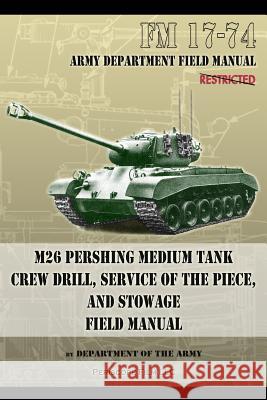FM 17-74 M26 Pershing Medium Tank Crew Drill, Service of the Piece and Stowage: Field Manual » książka
FM 17-74 M26 Pershing Medium Tank Crew Drill, Service of the Piece and Stowage: Field Manual
ISBN-13: 9781937684488 / Angielski / Miękka / 2013 / 168 str.
The Pershing was the first operational heavy tank of the US Army; originally the T26, the tank was eventually re-designated the M26 Pershing medium tank. Named after General John J. Pershing who led the American Expeditionary Force in Europe in World War I, it was briefly used both in World War II and in the Korean War. Intended as an improvement of the M4 Sherman, the prolonged time of development meant only a small number saw combat in the European Theater, most notably the 9th Armored Division's dramatic dash to take the Bridge at Remagen. Due to the Army's rapidly changing needs, the M26 was reclassified as a medium tank in May of 1946. Nevertheless, the Pershing represented a significant upgrade from the M4 Sherman in terms of firepower and protection. However, its mobility was unsatisfactory for a medium tank and its transmission was somewhat unreliable. In 1948, the M26E2 version was developed with a new powerpack. Eventually, this was re-designated the M46 General Patton and over 1,000 M26's were rebuilt to this new standard. The Patton series would replace the M26 by the early 1950s. Created in 1949, this field manual reveals a great deal about the M26's design and capabilities. Intended as a commander's manual for training crew members, it details many methods of attaining efficient teamwork while operating the tank. Drills are described in detail, with the ultimate goal being the successful operation of the M26 on the battlefield. Originally labeled restricted, this manual was declassified long ago and is here reprinted in book form. Care has been taken to preserve the integrity of the text.











